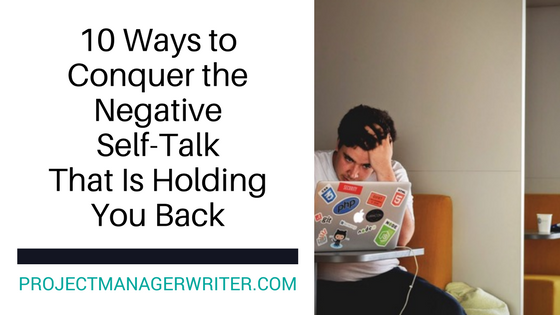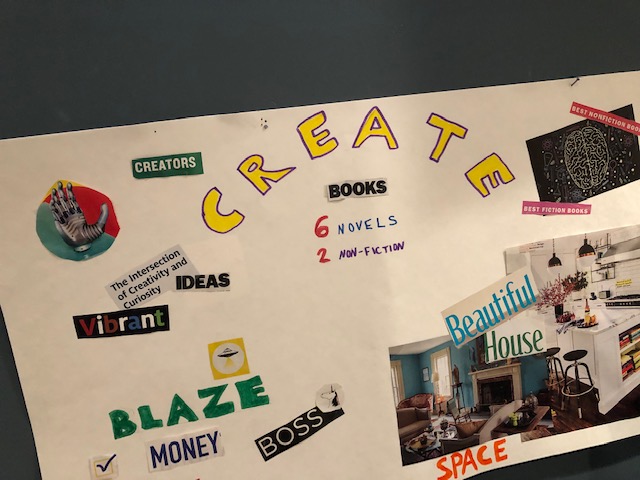Does your inner critic often trigger negative self-talk?
I hear from many authors at all levels of success. No matter the experience level, we all share something in common—negative self-talk.
Negative self-talk can pop up when you’re least expecting it–when you just finished a book or when you’re stretching yourself toward a new creative goal.
You’ll hear yourself saying things like:
“I’m no good.”
“Nobody will like what I’ve created.”
“People are going to laugh at me or say I’m a fraud.”
“I should just quit.”
The longer you write, create or run your own business, the less frequent your bouts of negative self-talk will be. But as far as I can tell, your inner critic will never go away entirely.
There are great books on the topic of dealing with resistance (see everything ever written by Steven Pressfield). Even so, I offer up a few ways that I’ve found to deal with the bad days. Do you have those days?
Bad days are when you’re so busy with work, or an unplanned personal emergency, that you have no time for yourself, much less any time to create that day.
Bad days come when you least expect them and can derail your entire week. They can leave you feeling drained, and you have nothing to show for it.
Being a successful creative means trying to limit the bad days as much as we can. Sometimes we can’t avoid a lousy day, but here are a few ways that I’ve found to break from the negative self-talk or routines that can often hold us back.
 1. Meditate.
1. Meditate.
Studies show that meditation can rewire our brains to be more positive, and can help us handle stress better.
In the book, Tools of Titans, Tim Ferris reveals that 80% of the billionaires, entrepreneurs, and icons in his book have a meditation routine.
2. Affirm your value.
There’s power in the things that we tell ourselves. When you spend a lot of time in your head (e.g., listening to your inner critic), you can lose sight of your value.
Keep a list of positive statements that you see every day. Say those statements out loud first thing in the morning.
Examples:
“I am creative. I am a successful author.”
“I enjoy having creative freedom and choosing to produce assets that I own.”
“I help others every day and share my knowledge with the world.”
The book The Secret brought the law of attraction mainstream but scared me away from this concept for years. Then I read how people like Scott Adams, Joanna Penn, and Honoree Corder have used affirmation principles effectively. Affirmations are a must-do if you want to change your mindset. Give it a try for a week and see what you think.
3. Have a morning routine.

Copyright: nesharm / 123RF Stock Photo
There are scores of books written about morning routines. I’m not an expert on the topic, but I buy into the belief that we are at peak creative productivity in the morning.
Notice I said peak creative productivity. Our brains are freshly rested in the morning, and we haven’t yet been bombarded with emails, to-do lists, and all the distractions of the day.
Morning is the best time of the day to create and mindfully practice getting better at the big thing we do, whether that’s writing, painting, or growing a business.
Keep the start of your day sacred as if it was a doctor appointment. Lock yourself away somewhere if you must.
4. Ditch your to-do list.
As a project manager and a creative, I’m often fighting between two sides of my brain. There’s the part of me that wants to organize and check tasks off a to-do list.
Then, there’s my creative side that wants to daydream and get into a flow state where there are no such things as deadlines.
I’m a big fan of the book, The ONE Thing. It’s great if you want to gain laser-focus on a big goal (such as writing a book or accomplishing a product launch).
Lately, I’ve created a hybrid approach that seems to be working. My goals are more fluid, or what I call fuzzy goals. My one thing is writing. Instead of having a hard goal to write X numbers of books this year, I focus on the habit of writing instead. I work toward a daily goal, say 1000 words a day, every day.
Before I know it, I have enough content to produce many books, blogs, and other products. The trick then is what to do next with all the content. That’s when it makes sense to have to-do lists and work toward an outcome.
5. Get inspired by experts.
Some of my best learning has come from reading the work of other authors and entrepreneurs who have been there. They’ve gone through the same struggles, took the time to write about it, and shared their mistakes with others.
Check out my recommended reading list here.
6. Find a support group.
You don’t need to go to support group extremes like the main character in Fight Club. Social media, especially Facebook, has made it easy to find others who are in your same situation.
Search Google or Facebook to find groups. I recommend the Aspiring Authors group if you are a newbie writer (or if you’ve been writing for awhile but want to get into self-publishing).
I recently found this Stephen King group and enjoy sharing my love of the macabre with others.
 7. Fill your creative well.
7. Fill your creative well.
In my book, Creating Space to Thrive, I mention several ways you can make time for creativity and how to get inspired to create.
In this busy world, we sometimes neglect our creative side. We put off new experiences or hobbies that we’d like to pursue. Often this is because we’re too busy or we’re putting pressure on ourselves and pursuing the wrong things.
I encourage you to make a date with yourself (or bring a friend) and visit a museum. Or hit the trail and take a nature walk. Or see a movie that makes you think.
If you’re in Chicago and ever want to go to a museum, let me know! I’m always up for a visit to get inspired:-)
8. Define your success.
I learned this from Joanna Penn’s Creative Freedom course. One of the things she encourages is for you to write down your definition of success. Otherwise, someone else will define it for you.
It’s up to us to determine what will make us happy and satisfied. For me, I want to write for a living, earn enough money for a comfortable living, and help others who are going through the same journey.
That’s my definition, but other authors may want awards, bestseller lists, or acknowledgment from a traditional publisher. I’m glad there are different visions of success. Otherwise, it would be boring.
9. Practice.
It seems like many writers don’t write as much as they should. I’ve definitely been guilty of this.
When I was in the corporate world, I didn’t always practice my craft because I wasn’t enjoying the work.
There’s a widely accepted principle that to become an expert at anything, you need 10,000 hours of deliberate practice. Malcolm Gladwell brought this idea mainstream.
Four hours a day of deliberate practice five days a week means you can become an expert in almost ten years. That’s a long time when you break down the math.
While it seems daunting, you don’t need to be an expert to have fun and make a living. There’s never a better time to start than now, no matter your age or occupation.
10. Say goodbye to negative people.

Source: https://unsplash.com



 1. Meditate.
1. Meditate. 7. Fill your creative well.
7. Fill your creative well.

Leave A Comment